
7th Memorial Event for Je Jeong-Gu
9 February 2006, Sejong Cultural Center Convention Hall
Seoul, ROK
Together with Poor Neighbors in Asia
By Denis Murphy
IN honoring Je Jeong-Gu we honor all the brave Korean people, especially the poor people, who resisted the military’s government’s eviction program in the 1980’s-1990s. When we were here with a Fact Finding Team from the Asian Coalition for Housing Rights (ACHR) in 1988 we were told some 80,000 families had been evicted. Je Jeong-Gu who took part in the resistance is a symbol, a representative of the poor people’s determination to have a decent home and to be free, and so we honor him and in honoring him, we honor the people.
While we honor the Korean urban poor, we should remember all the poor of Asia who have struggled for hundreds of years for a more decent and dignified life against caste systems, kings, foreign countries, landowners, business tycoons, and dictators. Millions of poor people sacrificed and acted courageously. What a wonderful tradition we are in and we should not forget this traditions of struggle. I don’t think Je Jeong-Gu would like that to happen.
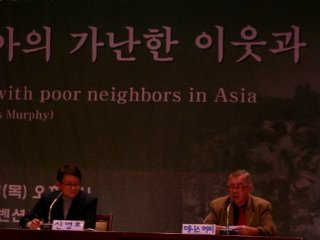
(Mr. Myong-Ho Shin, Vice-director of Korea Center for City and Environment Research is the served as translator for Mr. Denis Murphy.)
Many say community organizing is no longer needed. Times are different; governments are different; now is the time for cooperation with the authorities, people tell us. There may be more room for such cooperation of a critical kind, but there is also everywhere the need for people to organize for power. As long as greed and the lust for power corrupt human beings, the poor must organize and insist on their rights and dignity. Forced illegal demolitions of poor families which we talk about next are one example of this need, but first we thank the Korean farmers for teaching us once again at the World Trade Organization meeting in Hong Kong last December that people’s strong organization is necessary and good.
The Ramon Magsaysay Award Foundation thought of the same when it awarded Je Jeong-Gu and Fr. Jeong Il Woo their prize in 1986. The official citation praised the people’s resistance.
Those who are under 30 years of age may not know of the bloody battles that were fought for days between the poor people and the government goons. The police usually stood by. People and goons fought with stones, iron bars, clubs, boiling water, they fought hand to hand, the police used tear gas and many were injured.

Eventually in Korea you got rid of the military and built democracy and soon had a much better housing program. You have succeeded. There are still problems, but some of the old problems are solved, which is quite an accomplishment. Now you look for new challenges.
Other people in Asia have not been able to solve their problems. They, too have struggled hard, but they haven’t succeeded. They still struggle for housing, medicine, water, light, inexpensive food, drainage, clean and peaceful communities. They live in India, Pakistan, Bangladesh, Indonesia, Myanmar, Thailand, China, Philippines and other smaller countries, hundreds of millions of poor people. There is widespread hunger in Asia and thousands suffer and die for lack of food despite their best efforts to improve their lives through peaceful actions and advocacy.
Eviction are a good example. All over Asia poor people are evicted from their homes to make way for railroads, highways, canals, clean rivers and other often less useful purposes. In Manila 40,000 families who live along the railroad line are being evicted so the railroad can be improved. This project is funded by the Korean Government. Your President Roh Moo Hyeon was in Manila in December to inaugurate the program. Railroads are good, but we must also take care of poor people.
Why did Korea succeeded and the other countries did not? I think we have to give credit to economic growth South Korea has had decades of steady significant growth; the other countries have not. Economic growth assists people’s movements. Workers who have food in their stomach and some job security are more likely to act than those who have barely enough to live, and who live on a sea of unemployment, where they can be fired if they join a union, and they know that at any time ten men are ready to take their job.

Growth leads to a middle class, meaning people who have sufficient security and who are able to oppose the powerful without fear of losing everything. Most poor people are too vulnerable to all kinds of threats and disasters to carry on a long difficult struggle. Economic growth creates an environment favorable to democracy, solidarity and people’s movements. Economic stagnation has the opposite effect.
I would like to talk briefly in the time left about two aspects of organizing that were present in Je Jeong-Gu’s life and which are, I think, much needed in Asian organizing today. These two are: a political dimension to the work and a rich cultural-spiritual dimension. Je Jeong-Gu entered politics when democracy was restored. If I remember correctly not everyone here agreed with him. He thought it was a good thing. As an outsider I have no opinion on that. I don’t know if he was very religious, but he was very much influenced by my good friend, Fr. Jeong Il Woo, and he must have appreciated the role religion and culture played in Fr. John’s life. There is no doubt: in the Philippines politics, poor people’s politics, is the future.
Politics. Power to do good results most of all with elected politicians though they enough don’t use their power for good. Without political power we can make small gains but there will not be big gains even at local levels. We have to seek political power. We need poor people’s politics and poor people’s politicians.
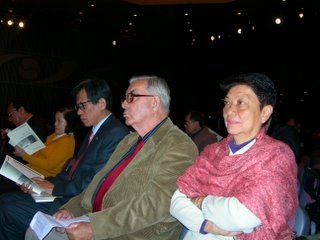
We hope to start in the Philippines a political process that will begin at the bottom with local leaders backed by local people’s organizations running for office at the village and neighborhood levels. In a few years maybe we’ll have candidates for town or city mayors. In 20 years… maybe a presidential candidate. It is a process that can be repeated by NGOs all around the country.
Culture-Spiritual. Today more than ever culture and the spiritual are important. By culture I mean here the national traditions of each country. Minjung, for example. We must draw strength and vision from them. The new economic globalization has brought an entire culture with it, a consumer culture that tells people “to work, make lots of money, spend, enjoy yourself.” How can our people resist this economic culture if they do not have other spiritual/cultural values? We have to remember the culture of the past, when people took care of one another, and the village was more important that the individual. Remember the World Social Forum slogan, “ Another World is Possible”. It is also true that another culture is possible. We need a culture that offers social values and a better vision of life, a culture that gives courage; that inspires and shows the way to all more humane life. We find the way to such a culture by returning first of all to the past. Remember the movie “Back to the Future”? We go back to the past to find the virtues needed for future struggle. We must adapt the past to our present needs, but we build on our forefathers and mothers.
We can discuss these matters later if you wish. Again I want to thank you for bringing us here to Korea and for being good friends for almost 40 years.
(Note: Mr. Murphy also made mentioned about the dialog he had earlier with CONET’s community organizers. He was asked about the kind of solidarity needed between Korea and the Philippines. Mr. Murphy identified the Philippine National Railway -South Railway Project being funded by Korean Government as a common agenda for solidarity. He identified three particular items: 1) For Koreans to ask the Philippine government to follow and implement its laws (i.e.RA 7279 or the Urban Development and Housing Act or), 2) ask the government to stop harassing and threatening urban poor, and 3) Request the Korean Government to provide funds for relocation sites basic services (day care centers, clinics, etc.) in the form of grants and not as loans.)
(The text of the speech above was taken from the pamphlet published by the JeJungGu Memorial Project.Photos courtesy of Mus.)
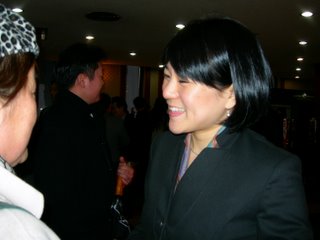
Duaghter of thelate Je JungGu.
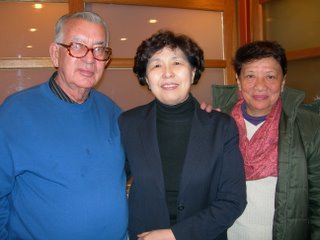
Denis and Alice with the wife of the late Je JungGu.
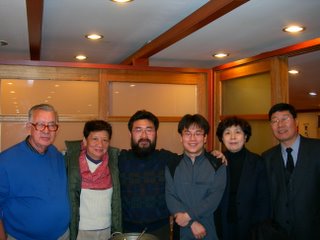
Denis and Alice with the staff of CONET and Je JungGu Memorial Project.

Denis and Alice with Mus and Agnes.
This article was also posted at locoa.net website.

No comments:
Post a Comment